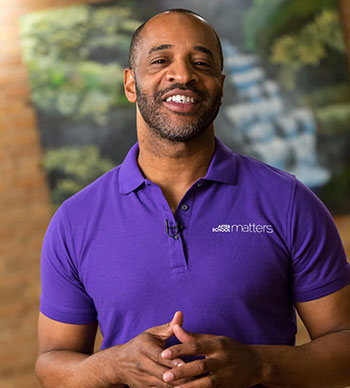
Michael Levesque
Michael Levesque helps his students at After School Matters in Chicago develop the skills they will need to succeed in college and beyond. Two weeks ago, those lessons included a brand new activity from IWitness that inspired his students to think about the world and their place in it.
Levesque has been an instructor at After School Matters (ASM) for 10 years. ASM, based in Chicago, provides after-school and summer programs for high school students in the form of apprenticeships and internships that cover topics from science, sports and technology to college readiness skills and communication.
Levesque is currently teaching a course called C.O.O.L. Communicators – Politics and Propaganda. Students learn about sources of influence on our society and our government, including media and interest groups. The goal is to challenge students to take a critical look at all sources of constructed messages through simulations, vocabulary-building activities, and real world applications. This will make them more savvy and informed citizens going through the 2016 Presidential election.
As USC Shoah Foundation staff worked with ASM to plan the first pilot of an IWitness activity with ASM students, it was determined that the C.O.O.L. Communicators class would be the best match for the activity being developed: “Skittles, Deplorables and ‘All Lives Matter’: Leadership and Media Literacy.”
In this activity, students learn about leadership and rhetorical styles, including argument, persuasion and propaganda as it pertains to public political discourse. They analyze political commentary and develop critical thinking and media literacy skills. They learn how to differentiate among types of rhetorical strategies employed in political communication and social media. They also develop their own contributions to the political debate using social media.
Levesque said the activity was the perfect complement to the skills his students work on in his program, including developing a deeper awareness of who they are and their life options, practicing strong oral, written and social communication, and building relationships.
“I was happy that I was given the opportunity to help the IWitness team conceptualize and develop the activity,” he said. “It proved to a be a great collaboration.”
The testimonies, articles and other parts of the activity worked well and kept the teens engaged, Levesque said. Although the day was longer than a typical class session, the pace and mix of activities held their interest.
The students were also impressed and excited that a USC Shoah Foundation camera crew was there to capture the experience. Normally, professional filming is only done for sports, entertainment, or something negative, Levesque said, so having a crew filming them meant a lot to the students and illustrated that what they were doing was important too.
“This day put academics and scholarship at the center in a way that was celebratory,” Levesque said. “In my opinion it helped reinforce the message that it is COOL to be smart and that you can spend an entire Saturday having fun while learning.”
The teens were also proud that ASM senior management was there observing and participating as well.
“Students remarked on how good it felt to be getting so much attention,” Levesque said. “During the recap discussions there was some evidence of envy from the students who were absent.”
In his conversations with students after the activity, Levesque found that it has had a significant impact on them. He will continue following up on what they learned with extension activities like vision boards, and he hopes to be part of future IWitness initiatives.
“The content as presented helped further expand how they think about the world and their place in it,” he said. “The discussions about atrocities, how they happen and how they get resolved put into new perspective of how politicians, public figures, media, communication skills and “regular citizens” matter.”